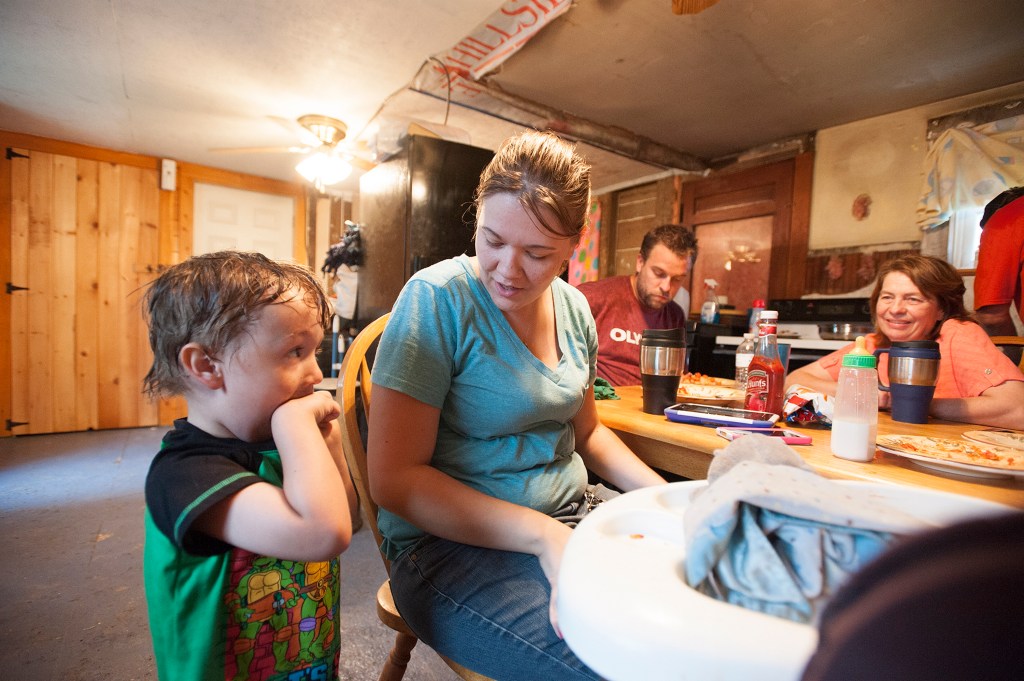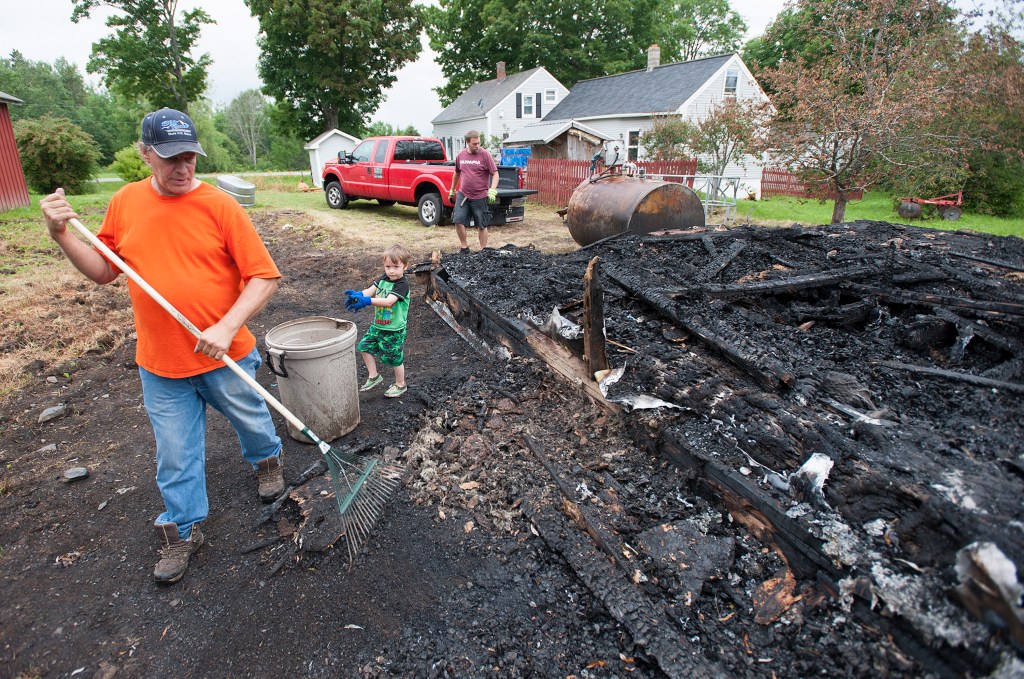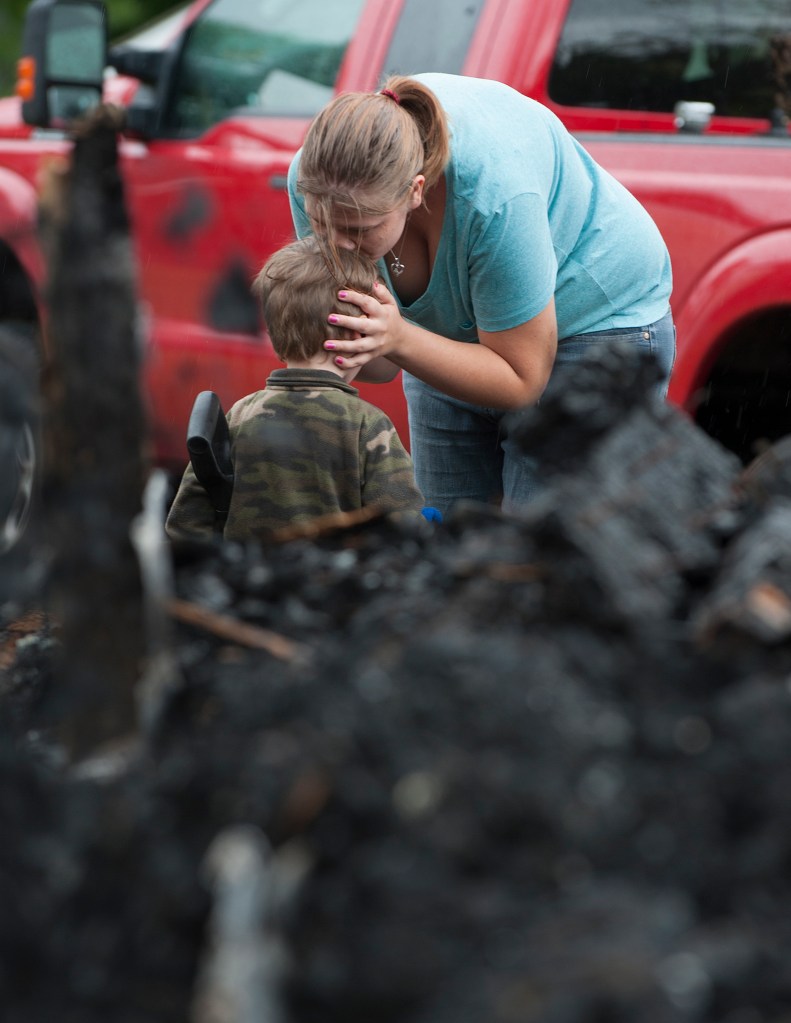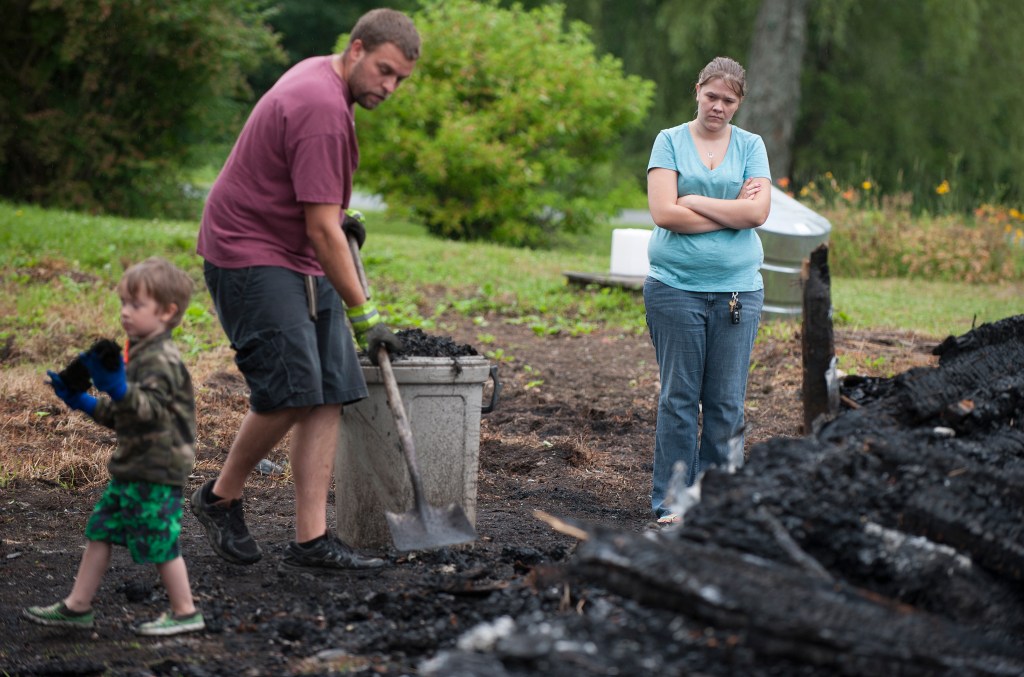As the remains of her parents’ barn in Benedicta smoldered, Brittany Irish begged police officers to stay and protect her from Anthony Lord, a registered sex offender who she said had kidnapped and raped her two days earlier.
Police said they couldn’t spare the manpower.
Nine hours later, two people were dead, four injured and a massive manhunt for Lord was underway. He surrendered later that day and was charged with murder and kidnapping.
The rampage police say Lord carried out in northern Maine on July 17 has focused attention on whether they could have done more to prevent the carnage, raising questions about officers’ legal and professional obligations to protect a victim of violent crime who may be terrified the attacker will return. The case also has drawn attention to staffing levels in a rural part of the state where four state troopers at a time patrol a geographical area the size of Connecticut and Rhode Island combined.
The U.S. Supreme Court has long ruled that police are not constitutionally obligated to provide personal protection to individuals, but experts say a situation such as Irish’s should have prompted a robust response from police – including a safety plan.
“They do the best they can providing public safety. The Maine State Police didn’t have an obligation to protect her individually,” said Jon Shane, an associate professor at John Jay College’s Department of Law & Police Science and Criminal Justice Administration and a former police captain in Newark, New Jersey. “The question is, could they have gone further to help her?”
Shane said the options could have included helping Irish get a protection order against Lord, getting her into a temporary residential facility or checking for outstanding warrants to find a way to lock him up.
“It’s possible (they could have done more), but I don’t know what they did,” he said.
State police – and Bangor police, in whose jurisdiction the original alleged abduction occurred – have not answered questions about their response to Irish’s allegations of sexual assault, saying they are barred from commenting because of the Maine attorney general’s ongoing murder case against Lord.
The chief of the state police, Col. Robert Williams, said in a statement Wednesday after Irish criticized the agency, “State police last week were investigating a sexual assault incident where Brittany was the victim. In the aftermath of many major incidents, state police typically conduct a review of our response and we will do so in this case.” He would not elaborate on what the review would include or what police did at the time.
That lack of information makes it difficult to assess how law enforcement performed in the lead-up to the killings.
Brittany Irish, however, blames them.
“I have to tell my children why they don’t have a father, and the only people to blame for that are Anthony himself and the state police,” she said last week at a news conference at her parents’ home in Benedicta, a town of about 250 people in southern Aroostook County.
QUESTIONS ABOUT POLICE RESPONSE
Irish talked about how Lord, a 35-year-old sex offender with a history of domestic violence and assault, kidnapped her July 15 from her home in Bangor and took her to a remote cabin, choked her with a seat belt and left her tied up alone for an hour. When he returned, he assaulted her four times, then only released her when she promised not to go to police or tell anyone else, she said.
The 21-year-old reported that attack to Bangor police, who referred her to the state police, she said.
“I was in the hospital six hours. I met with detectives for an hour after that,” she said. Police encouraged her to continue texting Lord as if nothing was wrong.
At some point, state police contacted Lord by telephone and asked him to come to the barracks, said Brittany Irish’s father, Rick.
Brittany Irish believes that telephone call tipped off Lord, who listed a home address in Houlton, that she had indeed reported him to the police. Faced with a lengthy imprisonment if convicted, that set him on his deadly crime spree, she said.
At 8:30 p.m. on July 16, firefighters were called to the Irish home in Benedicta for a report of a barn fire. The cause was suspicious and the State Fire Marshal’s Office responded that night to investigate.
Irish and her family were convinced Lord set the fire and were frightened he would come back.
“The only advice they offered was stay in the house,” Rick Irish said in an interview Thursday. “They deemed the place safe and told everyone to stay inside.”
“I had asked state police to stay here because I didn’t feel safe,” Brittany Irish said through tears during her news conference. “That’s when they told me they didn’t have the manpower to leave an officer here overnight.”
That issue – whether police are obligated to protect specific members of the public from a threat – has gone all the way to the U.S. Supreme Court.
In 1999, Jessica Gonzalez of Castle Rock, Colorado, told her town’s police that her estranged husband had kidnapped their three daughters in violation of a protection order. She tried for hours to get the police to find and arrest her husband but they didn’t, until he arrived at the police station armed. He died in a shootout with police, having already killed his daughters.
The Supreme Court voted 7-2 to reverse an appeals court decision, ruling that police did not have a constitutional duty to protect a person from harm.
In 1989, outside Los Angeles, a woman called 911 to say her estranged husband had threatened to come to the house and kill her. Police told her to call them when he arrived, but they would not station a cruiser outside the house. Within a half-hour, her husband had violated his restraining order and killed her, along with four guests.
The 9th U.S. Circuit Court of Appeals ruled that a lawsuit by her relatives should be rejected because the police behavior did not violate her constitutional rights.
DETERMINING THE RISKS
According to a court affidavit, Lord broke into the house of an acquaintance at 3 a.m. July 17 and stole guns and a pickup truck. An hour later, he burst into the Irish home, shooting to death Brittany Irish’s boyfriend and wounding her mother. Irish managed to escape out a bathroom window and jump into the back of a passing pickup, but Lord jumped in after her and shot at the driver, forcing him to pull over.
Lord then kidnapped Irish, allegedly for the second time in a week. An hour later, they stopped at a woodlot in Lee where two workers were preparing to start their day. One asked about the bleeding wound on Irish’s arm, where a bullet had grazed her, and Lord responded with gunshots, according to court papers. One worker was killed and the other wounded. Lord escaped in their pulp truck, taking Irish with him. Irish said Lord again sexually assaulted her.
At 2 p.m. Lord gave himself up to police at the home of his uncle in Houlton.
It’s not known at this point how aggressively police responded to Brittany Irish’s initial report, but policing experts say that ideally, the victim’s account would be taken seriously and that an interview with her would be conducted by someone trained to deal with traumatized victims.
“The number one indicator that a rape occurred is the report being made,” said David Markel, a former Colorado police detective who now trains officers – including Army personnel – how to investigate sexual assault cases.
“When most cops or detectives hear a story that somebody was raped, they are very skeptical of that report and end up investigating the victims more than the perpetrator to determine the victim’s veracity,” he said. Someone trained to recognize trauma knows that it can often lead someone to give an account of an attack that has gaps and contradictions, he said.
Lord’s criminal history would increase the credibility of the report, he said.
“All criminal history, but especially criminal history with domestic violence and sex assault, would tend to increase the suspicion level. If there’s any new report, the report would be credible, viable and need a priority response,” Markel said.
Irish said it was the police call to Lord that tipped him off to the fact that he was under investigation.
In any felony investigation, police should make face-to-face contact with the suspect if at all possible, Markel said. Alerting a suspect to an investigation could drive him into hiding or to retaliate against the person making the report.
The fire at the Irishes’ barn would have magnified the potential risk, Markel said.
However, police cannot arrest someone based on suspicion. They need to demonstrate probable cause that a crime has occurred or that a danger to the public exists, Shane said. In cases that involve an accuser’s word against the suspect’s, without corroborating evidence, police are limited in what they can do. Often those cases are presented to a grand jury, which determines whether there is enough evidence to bring a charge.
Rick Irish said that at the time police responded to the barn fire, “everybody” was looking for Lord. That suggests police took his daughter’s report seriously but couldn’t find Lord.
LOW STAFFING NUMBERS
Another factor influencing the police response to Lord’s alleged behavior is staffing.
Maine State Police Troop F covers Aroostook County and portions of Penobscot, Piscataquis and Somerset counties, an area larger than Connecticut and Rhode Island combined. The troop lists its staffing on the Department of Public Safety website as 18 troopers, three sergeants and a lieutenant, although spokesman Stephen McCausland said the troop has five vacancies. Its current staffing includes 14 troopers, two sergeants and a lieutenant.
A normal shift puts four troopers and a sergeant on the road, covering a rural territory of 9,000 square miles with 73,000 people, though local police and sheriff’s deputies also patrol portions of that region.
Rick Irish said troopers have historically been slow to respond to calls.
“I’ve called the police for 18 years,” he said. “If you call 911, you get Troop F. You might as well do it yourself.”
ADVOCATES CAUTION AGAINST BLAME
Even while questions remain about how police handled the case, Maine advocates for sexual assault victims and victims of domestic violence caution against making snap judgments.
“You can’t expect the police to be the bodyguards for people,” said Lois Galgay Reckitt, executive director for Family Crisis Services, which supports domestic abuse victims in Cumberland County. “I felt bad for the state police for getting accused in the middle of it. Was there enough evidence given or enough accusations given for them to just find the guy and arrest him? I don’t know. Could they have done more? Probably.”
The number of troopers in northern Maine may limit their ability to provide ongoing safety checks, she said. “It’s not like doing a drive-by in Portland,” a practice in which officers will periodically drive past a house to increase a victim’s security.
Destie Hohman Sprague, associate director of the Maine Coalition Against Sexual Abuse, which includes Aroostook County, said law enforcement agencies work hard to respond to reports of sexual assault and the topic is now required training at the basic law enforcement school required of all officers.
“We really believe that these cases are incredibly complicated and while we know law enforcement, just like every other community system, has a very long way to go before they’re addressing these issues the way we would hope, we absolutely acknowledge they’re undertrained, understaffed and underresourced,” she said. She would not comment specifically on whether her agency’s services were offered to Irish, citing confidentiality rules.
Lord and Irish met several years ago after they were introduced by a mutual friend. Irish has never said whether they were romantically involved, and her father said he did not know. Lord’s attorney said the two had a consensual relationship in the past, though he did not know when.
Irish’s father did obtain a protection from abuse order against Lord because of his criminal history. Lord had showed up at the hospital when Irish was giving birth to one of her two children because he was a friend of the child’s father.
The pair reconnected after she had a miscarriage and his 6-month-old son died under circumstances that are still being investigated, but he became obsessed with her, culminating in her abduction July 15, her father said.
HALLMARKS OF DOMESTIC VIOLENCE
Irish reported the July 15 attack against her to police as a sexual assault. The law enforcement response might have been different had it been reported as a case of domestic violence, a crime that often generates a more aggressive police response to ensure the safety of the victim and make available a number of other services.
Advocates and observers say Lord’s behavior with Irish bore many of the hallmarks of domestic violence.
“It was stalking, … predatory,” said Rick Irish. “Before you get to kidnapping, you have stalking and predation.”
While rapists often reoffend, they seldom do so with the same victim – except in cases of domestic abuse, where sexual assault often coincides with other aspects of a person’s domination of an intimate partner.
“I saw it as a domestic violence case from the beginning,” Reckitt said. If it had been treated that way, Irish may have had access to services such as a safe house, an option that exists to help victims of domestic abuse but which is rarely used by sexual assault agencies.
The level of violence in the case also corresponds to many domestic violence cases.
“Almost everyone who gets killed in a domestic violence case gets stalked after they try to break up with the person,” Reckitt said.
The dangers associated with domestic violence also have led to enhanced policing programs in parts of the state.
In Portland, advocates get a copy of a police report the next day that helps them assess a woman’s risk and help her stay safe. Victims are visited within one or two days by an advocate and an officer.
“We do a safety plan right there on the spot,” Reckitt said.
The details of the police response and any advice or services they may have offered to Brittany Irish might not become public until Lord’s trial, likely a year away. That information is necessary before determining whether police should have acted differently in the case, Markel said.
“The nature of this crime is such that it’s heinous in its content because of 20-20 hindsight,” he said, adding that while police should examine their performance and address shortcomings, people should not assume police did not perform acceptably because of the outcome.
“There’s not enough information to say law enforcement should have acted differently,” he said.
Send questions/comments to the editors.










